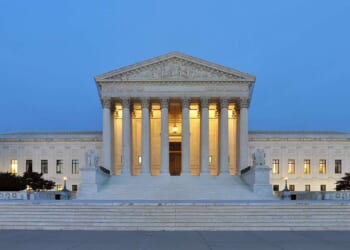One of the more grassroots responses to the current presidential administration has been the town hall meeting – a form of protest for some, and for others, the opportunity to hear from elected officials in the midst of sweeping change.
I attended a town hall last month and have not since been able to shake the testimony of one gentleman.
“I’m scared,” the man said in the midst of tears, “of losing my Social Security.”
Why We Wrote This
A story focused on
What can history tell us about the social contract between the U.S. government and the American people? Our columnist interviews author Justene Hill Edwards about the Reconstruction-era Freedman’s Bank, and draws a line from it to concerns today about Social Security.
The White House, for its part, released a statement March 11 saying that the administration “will not cut Social Security, Medicare, or Medicaid benefits.” That doesn’t account for an expected flurry of Social Security office closings.
It’s not bureaucracy that lingers for me, though. It’s the sense of betrayal from the government – the breach of a social contract. It is a far too familiar dynamic, from the postslavery promises of Reconstruction to the waning protections from the Civil Rights Movement of the 1950s and 1960s.
One of the distinct and lesser-known failures of Reconstruction was the rise and fall of both the Freedmen’s Bureau, which served as a liaison between formerly enslaved people and the federal government, and Freedman’s Bank, which initially provided a place for the formerly enslaved to house their newfound earnings. Justene Hill Edwards, a professor at the University of Virginia, has explored the bank in great detail. She is the author of the 2024 book “Savings and Trust: The Rise and Betrayal of the Freedman’s Bank,” and explains in an interview with the Monitor how comparing the politics of Reconstruction in the 1860s and 1870s to today might elicit remorse, but also reflection.
“I’ve heard people say that with the rise of Trump and [his] administration, our institutions and democracy are under assault and it’s going to dramatically reshape how we think about our relationship with the federal government, how especially African Americans are going to think about their place within the American body politic,” Ms. Edwards says in a phone interview. “At the same time, I think what we are experiencing now is a real opportunity to help us rethink how we want our nation to be constructed.”
The bank initially operated as a hub for financial literacy that gave Black people hope. That excitement inspired a $12.6 million investment from African Americans, which in today’s dollars is $300 million. What doomed the bank and bureau is ironic. Congress destabilized the bureau because politicians – namely, white Southerners – felt like they were giving Black folks a handout. Meanwhile the bank, mostly run by white Northerners, took Black folks’ handouts and ran off with them.
“This is a period of time when we start to see the beginnings of the rapaciousness of Gilded Age capitalism. … A handful of bankers were appointed to the bank’s board of trustees and really started stealing money from the bank, and therefore from African Americans,” Ms. Edwards says. “And it was their malfeasance that led to the bank’s demise in 1874, leaving an entire generation of African Americans with an extreme lack of trust, not just for the federal government, but in general for the American banking industry.”
There are folks who criticize overreliance on government, but in the case of African Americans, the promises made to Black communities were responses to previous wrongs. Ms. Edwards notes that the Freedmen’s Bureau was essentially the “face of the federal government” in the former Confederate South, helping the “transition from slavery to freedom” through the establishment of Black schools and hospitals, and the legalization of African American marriages.
Landmark legislation and court decisions of the Civil Rights Movement, such as the Civil Rights Act of 1964 and the Brown v. Board of Education ruling, were intended to rebuke the nearly centurylong rule of Jim Crow, which not only disenfranchised, but also dehumanized Black people.
That leaves us with uncomfortable questions: How do we restore trust in the federal government? In financial institutions? There are no easy answers, Ms. Edwards says.
“I think the responsibility has to fall on federal authorities to protect communities that have been plundered, exploited by these large financial and even small financial institutions. Whether that will happen, I don’t know. I wish I were more positive, and I’m trying to be, but that’s really hard now,” she admits. “But I will say, I think this is an opportunity for Black communities around the nation to start thinking about uplift from the inside out as opposed to waiting for kind of external factors to help us do that.”
Angst in this moment is understandable, but Ms. Edwards believes that history can be a salve.
“We need to look at [Reconstruction] to really start to get answers to these larger questions that we continue to have in America today about the persistence of racial inequality,” she says. “Perhaps some of the keys to unlocking so many of these problems stems from a broader understanding of the generational impact and the history of slavery.”







